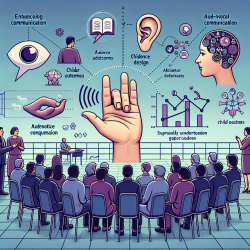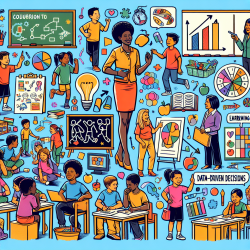In the rapidly evolving field of online therapy, especially within special education, staying abreast of the latest research findings and implementing them into practice is crucial for therapists. One such piece of research, "A Transactional Approach to Early Language Training: Derivation of a Model System," provides valuable insights that can significantly enhance therapeutic practices. This blog explores how practitioners can improve their skills by integrating the outcomes of this study or by delving further into its research.
The transactional model of language development, as detailed in the study, emphasizes the dynamic interactions between children and their caregivers or therapists. It highlights how these interactions contribute to language acquisition and suggests a holistic approach to therapy that goes beyond traditional methods. For online therapists, understanding and applying this model can lead to more effective and engaging therapy sessions.
Implementing Research Findings into Online Therapy
Here are practical ways online therapists can incorporate the transactional approach into their sessions:
- Interactive Sessions: Design therapy sessions that are highly interactive, encouraging active participation from the child. This can be achieved through games, storytelling, and activities that require back-and-forth communication.
- Parent Involvement: Train parents to use the transactional approach during their daily interactions. As online therapy might limit direct contact with the child, empowering parents becomes crucial. Providing them with strategies to enhance language development can extend the benefits of therapy beyond the sessions.
- Environment Assessment: Use online tools to assess the child's speaking environment and provide recommendations for creating a language-rich setting. This can involve suggesting changes in the home or advising on the use of certain toys or educational materials that promote language development.
- Customized Activities: Develop activities based on the transactional model that are tailored to each child's specific needs. This requires a deep understanding of the child's current language abilities and challenges, as well as their interests and preferences.
- Professional Development: Continuously seek out additional research and training on the transactional approach and other emerging theories. This commitment to professional growth will ensure that therapy practices remain cutting-edge and highly effective.
By integrating the principles from "A Transactional Approach to Early Language Training" into online therapy, practitioners can foster a more conducive learning environment for children with language disorders. This approach not only enhances language development but also supports overall cognitive and social growth.
Encouraging Further Research
The field of online therapy, particularly in special education, is ripe for further research. Practitioners can contribute by:
- Conducting case studies on the application of the transactional approach in online settings.
- Exploring the effectiveness of parent training in supporting language development.
- Investigating the impact of the transactional model on children with specific language disorders.
Such research can expand our understanding of best practices in online therapy and lead to more refined and effective therapeutic techniques.
In conclusion, "A Transactional Approach to Early Language Training" offers valuable insights that can significantly enhance the practices of online therapists in special education. By implementing these findings and encouraging further research, practitioners can improve their skills and better support the children they serve. For those interested in exploring this research further, please follow this link to read the original research paper: A Transactional Approach to Early Language Training: Derivation of a Model System.










